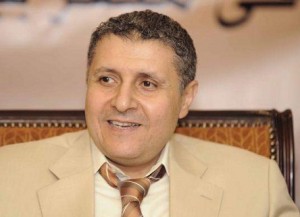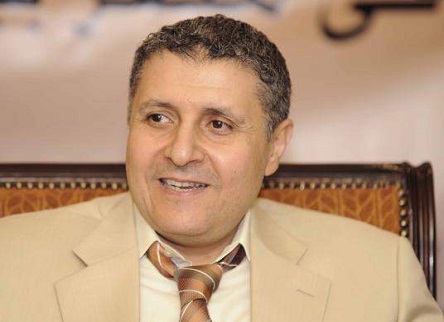The strange charges against judges Assem Abd al-Gabbar and Hisham Raouf conceal an attempt to silence independent voices in the judiciary.
 The undersigned organizations are extremely concerned by the investigation of judges Assem Abd al-Gabbar and Hisham Raouf and the questioning of rights lawyer Negad El-Borai, the director of United Group, a leading civil society organization, three times, the last of which was on Monday 1 June, after they submitted a draft law to combat the crime of torture.
The undersigned organizations are extremely concerned by the investigation of judges Assem Abd al-Gabbar and Hisham Raouf and the questioning of rights lawyer Negad El-Borai, the director of United Group, a leading civil society organization, three times, the last of which was on Monday 1 June, after they submitted a draft law to combat the crime of torture.
The undersigned organizations believe that these charges are aimed at harassing independent judges who support legislative reforms to improve the human rights situation and makes clear that reformist efforts from within the justice system will be met with measures to force judges into retirement. The de-legitimization of United Group is part of the unprecedented crackdown on civic groups that seek to improve the appalling rights and legal situation in Egypt.
United Group held a workshop for experts on March 11, 2015 to present and discuss a draft law, written in conjunction with legal experts and judges—among them Hisham Raouf and Assem Abd al-Gabbar — to codify the criminalization of torture in Egyptian law. The law would comply with constitutional provisions and international standards and would be consistent with recommendations accepted by Egypt during the Universal Periodic Review of its rights record before the UN Human Rights Council in 2014.
After United Group forwarded the draft law for consideration to the relevant state bodies, including the Ministry of Justice and the presidency, news stories citing judicial sources reported that a judge had been assigned to investigate Abd al-Gabbar and Raouf based on their contributions in the drafting of the law and their participation in the workshop organized by United Group.
El-Borai subsequently received a summons from the North Giza Court to appear on May 16 to give a statement in connection with the investigation into the two judges, who are accused of dealing with an illegal organization, a reference to United Group.
Over the last 18 months, the United Group has filed some 163 complaints involving 465 allegations of torture in detention facilities, but the Public Prosecution did not take prompt action, leading United Group to file several complaints with the Judicial Inspection Directorate to ensure that swift investigations were carried out. The only swift investigations carried out, however, have been in relation to the draft torture law case and against El-Borai.
This sends the message that timely investigations will be launched against those seeking to improve the Egyptian legislative environment while perpetrators of torture remain immune from punishment. The state, first and foremost the judiciary, seemingly does not deem it a crime for public law-enforcement officials to torture, but looks askance at those who file reports about it or offer legal remedies to end the crime of torture, which under the constitution is a crime not subject to a statute of limitations.
The undersigned organizations believe that the investigation of judges Assem Abd al-Gabbar and Hisham Raouf is a form of harassment, targeting them for their public stances on the independence of the judiciary and their ongoing demands to end the politicization of the judiciary. It should be noted that the two judges had previously sought to see a new law that would guarantee judicial independence. The undersigned organizations also believe the ludicrous allegation of cooperating with an illegal organization reflects a desire to punish them.
The United Group represents a venerable law firm with a history of some 74 years. It is considered one of the most important reservoirs of legal expertise in Egypt. In addition to the practice of law, it engages in other legal activities, conducting legal research and drafting laws to improve legislation in Egypt. It is natural that judges and lawyers would work together to serve the law and constitution and examine ways to activate constitutional guarantees that protect human rights. The odd thing is calling a law firm an illegal organization and prohibiting judges from working with it. We view these charges as part of the unremitting efforts to criminalize, ban, and punish any institution engaged in any activity related to human rights.
The undersigned organizations affirm that the participation of judges in public life is not a punishable offense, particularly when their participation is so closely related to their work as legal experts. The real crime is the systematic destruction of the justice system. There seems to be an unspoken agreement to ignore mass death or life sentences, and judges now frequently express their political opinions in connection with cases pending before them, whether from the bench or in the media. This appears acceptable as long as the stance taken is supportive of the current administration in Egypt.
The undersigned organizations urge the Egyptian government to respect the constitution and its international commitments and take action to amend legislation to ensure the timely, decisive prosecution of persons who engage in the crime of torture. We also call on the government to immediately suspend the investigation of judges Hisham Raouf and Assem Abd al-Gabbar, demonstrate a strict commitment to judges’ freedom of expression, ensure the autonomy of the judiciary and judges, and actively and positively cooperate with institutions working to bring Egyptian law into compliance with Articles 51, 52, 55, and 99 of the constitution. These articles make torture a crime not subject to a statute of limitations and prohibit all forms of torture. They also give torture victims the right to directly appeal to the judiciary while requiring the state to provide fair compensation to them. We further call on the state to comply with Article 93 of the constitution, which makes international human rights conventions and treaties ratified by Egypt binding and gives them the force of law.
Signatories
- Cairo Institute for Human Rights Studies
- Hisham Mubarak Law Center
- Nadim Center for the Rehabilitation of Victims of Violence
- Association for Freedom of Thought and Expression
- Nazra for Feminist Studies
- Egyptians Against Religious Discrimination
- Arabic Network for Human Rights Information
- Center for Egyptian Women’s Legal Assistance
- National Group for Human Rights
- Appropriate Communications Techniques for Development
- Egyptian Initiative for Personal Rights
- New Woman Foundation
- Andalus Center for Tolerance and Anti-Violence Studies
- The Egyptian Center for Public Policy Studies
- Arab Penal Reform Organization
- Alhaqanya Center for Law and the Legal Profession
- The Human Rights Association for the Assistance of Prisoners
- Egyptian Commission for Rights and Freedoms
- Egyptian Association for Community Participation Enhancement
Share this Post

